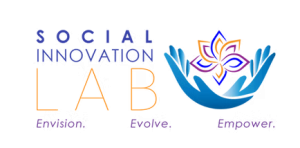
Teachers using Love Notes in the classroom
Organization: Social Innovation Lab
Program Name: Better Future Project—Teen Pregnancy Prevention
Overview of Program: The federally funded Better Futures Projects (BFP) works with Family and Consumer Science teachers in Kansas and Oklahoma classrooms. With a focus on bringing quality curriculum to under-resourced schools in rural areas, the BFP have reached nearly 3,000 students across the region with evidence-based programs that help youth have the best start to their adult lives possible.
Funding:
- Sexual Risk Avoidance Education (awarded 2019, 2020, 2022, and 2024)
- Personal Responsibility Education Program (awarded 2021)
What Problem is Being Solved?
Outside organizations often partner with schools, mostly located in urban areas, to teach healthy relationship skills education, but the facilitators leave after implementation and are unavailable for ongoing questions from and support for youth.
Additionally, when program funding ends, services to youth stop as there are no longer program facilitators available to implement.
Finally, rural communities are often overlooked and underserved.
Training and utilizing teachers who teach the content within the school setting, to support state approved course frameworks, is both cost effective and sustainable over time. It is also the best way to support youth in their journey to adulthood.
Curricula Used: Love Notes —both Classic and SRA versions.
Curricula Benefits: Love Notes (LN) closely aligns with Family and Consumer Science standards for several state approved courses.
LN has generated great classroom conversations, fostered the growth and strengthening of student-teacher and peer-to-peer relationships.
Instructors: High school Family and Consumer Science teachers who have been trained in the Love Notes curriculum.
Location of Instruction: High school classrooms in rural Kansas and Oklahoma.
Length of Instruction (# of Sessions and Hours per Session) Session length varies by school and implementer, ranging from fewer than 10 hours to over 35 hours.
Instruction time varied largely because some facilitators only had one to two youth so discussions and activities took less time whereas other facilitators had larger groups and supplemented each lesson with additional content and activities.
Class Size: One average, 10-15 youth per class.
Target Audience: Rural high school students (ages 13-19).
Audience Demographics: All youth are high school students from rural communities in Kansas and Oklahoma.
Across all of the Better Futures Program projects, an average of 91.25% of youth identified as Caucasian (of those, an average of 10.25% identified as Hispanic/Latino), 7.75% of youth identified as Native American/Alaskan Native, and 3.5% of youth identified as Black or African American.
The youth who participated in these programs were overwhelmingly female and living with either their parents or a family member.
Instructor Training: All instructors were required to be trained in Love Notes by a certified Dibble trainer. Social Innovation Lab hosted multiple in-person and virtual trainings for teachers.
Student Journals: All students utilize the Love Notes participant journals. Teachers were provided with the journals for their students in either a physical copy or a PDF version.
Incentives to Teachers and Students: All teachers who complete the curriculum training received either a $250 stipend (virtual training) or all travel expenses paid (in-person training). Teachers received a $500 stipend for implementing all 13 lessons. Students received two $10 gift cards for completing the pre and post surveys.
Challenges: Recruiting and retaining teachers as program facilitators has been particularly challenging given the (1) shrinking of rural communities, (2) politically conservative climate, and (3) high turnover rate of teachers in schools across Kansas.
Observable Outcomes: Social Innovation Lab utilized pre and post-surveys to measure student outcomes in regards to sexual risk avoidance and healthy relationship formation and management. In one study, students who completed the curriculum felt more strongly about abstaining from sex and, if they did decide to engage in sexual activity, practicing safe sex. 88% of these students would recommend Love Notes to someone they know.
Social Innovation Lab also utilized monthly teacher performance surveys to measure how things were going and collect feedback from teachers. Over the course of all of the Better Futures Project programs, teachers/facilitators have felt positive about the curriculum and the conversations it encourages in their classrooms. Given that the curriculum does touch on sex, some teachers/facilitators encountered pushback from their administration or parents of students.
Class Anecdotes: “If you want a way to reach students who may be at risk of sliding into high-risk relationships or repeating patterns of behavior that will change the trajectory of their lives and you want more for them? Then encourage them to invest in themselves by simply spending a few days this summer in a crash course of “Love Notes” that will take them through the right way to build the kind of healthy relationships with others that everyone deserves and avoid dangerous love.
The Love Notes research and evidence-based curriculum is a game changer for reaching students by engaging them in relevant conversations that give them the practice and tools to navigate the complicated nature of their relationships with others.
I highly recommend this course to parents, teachers, and community teen support program partners. My students would give it 5 out of 5 stars.”
Tips for Others:
- Offering review copies of the curriculum to parents and school administration is helpful as ‘social-emotional learning’ and ‘sexual risk avoidance’ teaching can be hot-button issues. Transparency is key.
- Providing incentives and support to teachers/facilitators is crucial to recruitment and retention. Useful, small incentives for parents and youth encourages survey completion.

